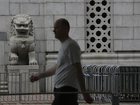The ranks of Hong Kong democracy protesters who have paralyzed parts of the city swelled into their tens of thousands Monday, digging in for another night of confrontation with police in their campaign for free elections.
In the worst unrest since the former British colony was handed back to China in 1997, demonstrators fought hours of running battles with police Sunday night, choking on clouds of tear gas as officers attempted to suppress the crowds.
 Full Story
Full Story
Pro-democracy demonstrators in Hong Kong blocked a second major thoroughfare, this time across the harbour, after police had earlier used tear gas to disperse huge crowds in the city's center.
Around three thousand demonstrators blocked a major road in the city's congested Mongkok district in Kowloon, bringing traffic to a standstill and opening up a second significant flash point in the key financial hub.
 Full Story
Full Story
Thousands of pro-democracy protesters massed outside Hong Kong's government headquarters on Saturday night, vowing to keep up an increasingly tense civil disobedience campaign unless Beijing grants more political freedoms.
Defiant protesters, almost all wearing convenience store-bought ponchos and eye protection in anticipation of police using pepper spray, were dug in outside the complex where 74 people have been arrested.
 Full Story
Full Story
More than 2,000 Hong Kong secondary school pupils, some wearing uniforms, joined university students on Friday to bolster a days-long protest against Beijing's refusal to grant the city unfettered democracy.
Throngs of teenage students -- many saying they had defied their parents' wishes -- descended on the Southern Chinese city's government headquarters to add their voices to a class boycott kicked off by university students on Monday.
 Full Story
Full Story
Striking students began marching on Hong Kong's financial district Wednesday, taking their protest for greater democratic rights to the city's commercial center for the first time.
Student groups are currently spearheading a civil disobedience campaign by a coalition of democracy activists protesting against a recent decision by Beijing to vet who can stand for the city's top post at the next election.
 Full Story
Full Story
Hong Kong students mobbed the city's leader Tuesday in angry scenes as they took their anti-Beijing strike to government headquarters, where hundreds protested against China's refusal to grant full democracy.
Organizers said 13,000 university students massed at a northern campus on Monday to launch a week-long boycott of classes, a strong showing that breathed new life into the democracy campaign which had been stunned by Beijing's hardline stance.
 Full Story
Full Story
Hong Kong students on Monday began a week-long boycott of classes, gathering in their thousands for what democracy activists say will be a wider campaign of civil disobedience against China's refusal to grant the city unfettered democracy.
Student activists crowded onto a campus on the northern outskirts of the city, many sheltering from the hot summer sun under umbrellas and waving their faculty flags, as their leaders vowed to ratchet up their campaign if their demands were not met.
 Full Story
Full Story
More than 1,000 activists paraded through Hong Kong's streets on Sunday carrying huge lengths of black cloth, in a somber protest against a recent decision by Beijing that crushed the city's hopes for full democracy.
Democracy activists in the former British colony had expectations Hong Kongers would be able to vote for their leader cut short in August when China announced plans for a highly restricted form of universal suffrage.
 Full Story
Full Story
Hong Kong police have arrested at least 22 people during a series of protests targeting a senior Chinese official visiting the city, authorities said Tuesday.
The city has been plunged into political crisis after pro-democracy activists vowed to take over the streets of the city's financial district following Beijing's refusal to grant citizens full universal suffrage.
 Full Story
Full Story
Hong Kong democracy activists vowed Sunday to embark on an "era of civil disobedience" including mass sit-ins after China announced rules giving it control over candidates in the city's next leadership election.
The standing committee of the National People's Congress (NPC), China's rubber-stamp parliament, decided that the next chief executive will be elected by popular vote in 2017, but candidates must each be backed by more than half the members of a 1,200-strong "broadly representative nominating committee."
 Full Story
Full Story



